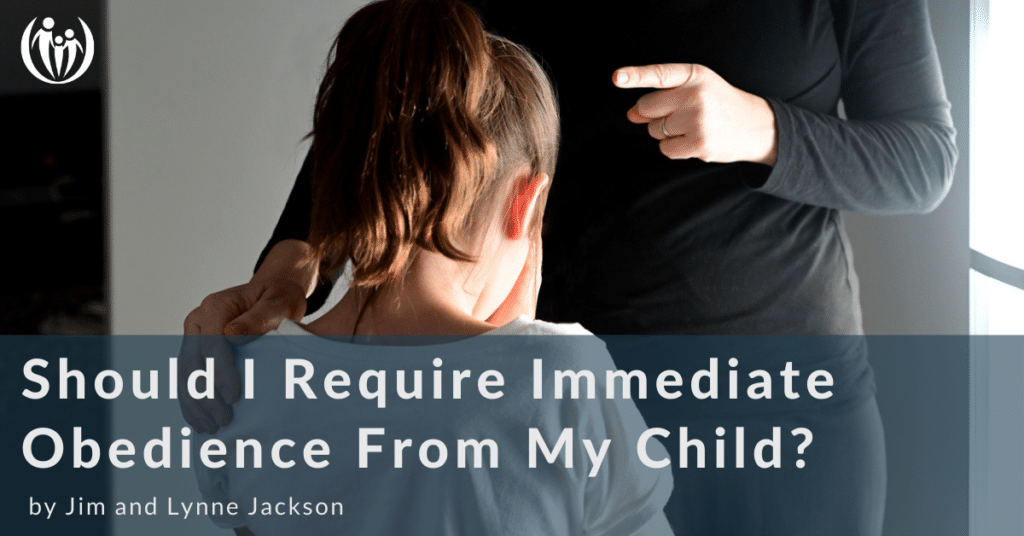
Should I Require Immediate Obedience from My Child?

What parent wouldn’t love it if a child obeyed consistently, quickly, thoroughly and cheerfully, especially in front of other parents, or Gramma and Grampa, or the pastor! “Obey all the way, right away, in a cheerful way…with a happy heart” is a common way that many parents define immediate obedience. And truly, when it comes from a sincere heart, obedience is a very good thing.
Many parents think that consequences should be given quickly and frequently to train kids to obey immediately every time they are given a directive. Or at least look like they’re obeying. Some parents have even told us this idea is so ingrained that they believe, “I’m letting my child get away with stuff if I don’t quickly and firmly discipline.”
We wrestled a lot with this concept when our kids were young! We put a great deal of thought into considering this from a biblical perspective, because that’s what mattered most to us. And we reached some different conclusions than many of the authors we’d been advised to read.
A biblical perspective on immediate obedience
The rationale for enforcing immediate obedience with quick consequences is often based on Ephesians 6:1: “Children, obey your parents in the Lord, for this is right.” It’s a verse we all want our children to heed. However – the verse isn’t aimed at parents, it’s aimed at children. It’s not a parent’s job to convict their kids about the importance of this verse. That’s the Holy Spirit’s job. The parents’ job is explained clearly a few verses later: “Fathers [or parents], do not exasperate your children; instead, bring them up in the training and instruction of the Lord.”
In other words, parents, raise your kids in such a way that when they are able to hear their verse, they will trust and obey. In fact, rather than requiring immediate obedience through quick consequences, scripture seems to acknowledge that obedience is often a learned process. The ultimate keys for growing in obedience are God’s amazing grace, true repentance, and reverence for God’s desires.

Did Jesus demand obedience?
In the parable of the two sons, two sons are asked by their father to “get to work.” One said, “Yes, dad,” but ditched the work. The other said, “No, dad,” but later had a change of heart and went to work. Jesus taught that the son who was initially defiant, but had time to reconsider and obey, was the obedient son. So what looked like obedience was actually rebellion, and what looked like rebellion without an immediate consequence became obedience; a picture of how God is “gracious and compassionate, slow to anger and rich in love.” (Psalm 145:8)
Let’s consider a practical example
Let’s consider a practical example: the misbehavior of sibling conflict. How often do parents quickly and sharply confront or discipline children for selfish, arrogant arguing? (That scenario between irritated parents and arguing kids certainly happened in our household at times!) It’s helpful to look at how Jesus navigated this issue with His disciples (Matthew 9:33-37):
Then He came to Capernaum. And when He was in the house He asked them, “What was it you disputed among yourselves on the road?” But they kept silent, for on the road they had disputed among themselves who would be the greatest. And He sat down, called the twelve, and said to them, “If anyone desires to be first, he shall be last of all and servant of all.” Then He took a little child and set him in the midst of them. And when He had taken him in His arms, He said to them, “Whoever receives one of these little children in My name receives Me; and whoever receives Me, receives not Me but Him who sent Me.”
Of course Jesus knew that they were arguing and what they had been arguing about! He was in no hurry to address their conflict until He saw the right, poignant teaching opportunity. Even then He didn’t mention the arguing but he corrected the sin with a vivid, visual teaching of the importance and the blessing of the opposite attitude and behavior – humility and service to others. Nothing immediate about it.
Picture that scene, and imagine the disciples all watching the expression of tender affection on Jesus’ face as he drew the little child into his arms. This approach takes a lot more thought and intentionality than a quick sharp rebuke or punishment aimed at quickly stopping irritating behavior in the name of obedience.
5 pitfalls of demanding immediate obedience
In our decades of extensive work with families, we have observed both strict and graceful ways of helping kids learn about obedience. Some parents model heart-felt obedience to God, and also bring lots of grace and love to their focus on training kids to obey immediately. But it’s helpful for all of us to be aware of potential pitfalls so we can thoughtfully avoid them.
Before unpacking some strategies for keeping God’s grace front and center in this challenge, we’ll share five some of the pitfalls we’ve seen. These pitfalls may happen when parents are overly focused and rigid about requiring on immediate obedience.
When parents are overly focused on immediate obedience it may result in:
- Children who are “little moralists” and think that life is only about doing the right thing. When kids obey a command primarily to avoid punishment, they can begin to think all that matters is behavior, not their hearts. Phil Vischer, creator of VeggieTales, has expressed concern that the end result of all his behavior training videos was lots of little moralists who didn’t realize they needed a Savior. In all his focus on behavior, he didn’t communicate that life is about walking in an often messy, but forgiven, relationship with Jesus. (See his kids’ book Sydney and Norman for a refreshing story that makes God’s unconditional love for children clear.)
- Children who have little spark or creativity. A requirement for immediate obedience leaves a child little room for creative problem-solving about how to get something done or do the right thing. One teacher in a Christian school once told us she could almost always spot the kids raised in homes where strong consequences were given in the name of immediate obedience. She said, “They are well behaved and never question a directive, yet there’s no spark in their eyes and little creativity to take risks or think outside the box. I’d take a classroom full of lively, creative kids any day.”
- Children who self-destruct when given freedom as young adults. One therapist said, “Christian counseling offices are full of the adults who are the product of controlling, punitive parents.” Kids are especially vulnerable to struggling as adults if their parents thought for them by making everything be about commands and obedience. In those families, kids don’t learn who they are, what’s important to them, how to make wise decisions, or how to problem-solve their way through a conflict.
- Children who resent their parents as they become adults. Immediate obedience thinking can weave through the fabric of the whole relationship. We have heard many adults make statements like, “I’m just not that close to my parents. They still seem to want to tell me what to do.” Or, “My parents still think they know better than me.” This resentment can carry into grandparenting as well. Some grown kids don’t want to trust their parents with their grandkids.
- Children who struggle to feel close to God. A common defense of requiring immediate obedience is, “I make sure my kids obey me quickly, so they will also learn to obey God.” These parents may have great intentions, but it appears that the opposite may be true. A report titled Attachment to God and Parents reveals that “Respondents from overprotective, rigid, or authoritarian homes tended to report both greater God Anxiety and God Avoidance. …it appears that authoritarian parents produce children with concerns about their personal worth and God’s love…”
What about kids who are compliant?
One young man who, as a child, was “obedience-trained” in a Christian household said, “When my parents dropped me off at college, I was drunk before their tail lights disappeared on the horizon.” It took years of recovery from alcoholism for him to find his way to deep and abiding faith.
This self-destruction also happened to a friend of ours. While growing up she submitted to the requirement of immediate obedience. It looked good to her parents and kept her out of trouble. But our friend resented that control and quickly and angrily “came off the rails” when she moved out of the home.
With no “immediate obedience” controls in her life, she struggled to make wise choices while she simply learned to “obey” her boyfriends, and became a single mom in the process. In tears, she stated, “I have no idea who I am or how to make a wise decision.” Her difficult journey surprised her parents because they said she was the most compliant of all their kids.

4 ways to encourage obedience in kids
Do these concerns mean that we shouldn’t train our kids to obey us? Of course not, obedience to parents is a really good thing, but it’s how we train our kids that is important.
1. Set an example and “live out loud.”
If you regularly set an example of obedience to God, this is a great start! For your kids to know of your obedience, and the benefits of it, keep talking about it. For example, if you responded to God’s conviction regarding a co-worker – say so! It might sound like this, “At work today God convicted me of my critical statement to a coworker. I obeyed right away and went to apologize and make it right. That felt so good!”
Or, perhaps you’re working on honoring your own parents in obedience to Paul’s teaching in Ephesians 6. You could say, “I’ve been intentionally obeying the Bible’s teaching to honor my parents by not getting so impatient when they want to talk for a long time about something. It feels so much better to obey God than to disrespect them by becoming frustrated!” You could even invite your child to give you a high five when you do! There is no end to ways you could set an example and live out loud like this.
2. Affirm obedience when you see it
Let’s face it. Kids DO obey sometimes. When they do, a little affirmation can go a long way. You can say, “I noticed you cleaned up as I asked. That’s a blessing to the family.” Or, “You were super respectful to that server. I bet he appreciated that.” This sort of affirmation helps your kids see, and possibly experience, the benefit of obedience in real-time – which grows their desire to feel it again. Watch for times when kids do obey quickly and put your focus on specific ways that their obedience is a blessing to others.

3. Have family meetings
We highly recommend gathering the family regularly to talk about any number of things. One of the things you can do is have a meeting where you list and discuss the family rules – just to be sure they are clear for everyone. You could also try this meeting idea: When the topic is obedience you could simply ask the question, “What would our family be like if we all disobeyed God’s ways all the time?” and, “How about if we obeyed all the commands all the time?” Keep it light. Have fun with these questions.
Then shift gears and ask, “What makes it hard to obey sometimes?” Share examples of some ways you struggle to obey and do what you know is right. Then invite your kids to do the same.
Finally, ask the kids about times when you’ve done the best job of addressing their disobedience. Make a list and let them know you want to work on addressing misbehavior in grace-filled, helpful ways. This lets kids know:
A) You WILL be addressing disobedience
and…
B) You’ll work to be graceful when you do.
4. Open the Bible
Be intentional to open the Bible with your kids at mealtime, bedtime, at a family meeting or throughout the day. Do this proactively; NOT in response to disobedience. Choose a few verses that would most encourage your kids. Here’s a set of verses to get you started. Make these conversations fun and playful when possible. You can even pray together to ask for God’s help with obedience. These proactive efforts will lay a healthy foundation for when it’s time to engage with your kids’ disobedience.
So what do we do when they disobey?
Any time your kids misbehave you have a golden opportunity to bring God’s grace and truth to life! (This is what our book, Discipline That Connects With Your Child’s Heart is all about.) Here are some specific ideas about how to do just that:
Leave or create space
With a neutral expression, consider using the phrase, “We all need a break to think about this.” Like the second son in Jesus’ parable we mentioned above, with a little space to think about his choice, (and perhaps even feel the guilt of it without intervention) the son came to a place of true, repentant obedience.
In this space, you can allow room for mistakes, and for experiencing the natural impacts of choices. We’ve had many parents tell us that when they give their kids space to calm down, their child is more likely to want to do the right thing. There’s even room for you to realize that what you’re asking may not have been clear, or may have had your own selfish motives behind it.
Again, teaching kids to value obedience IS important. And not all kids will respond to the Holy Spirit’s conviction when you provide space. Do your best to model the Holy Spirit and the Fruit of the Spirit as you come alongside your kids to help them learn.
Choose compassion
In the space between disobedience and your next response, pray that compassion and grace would rule that response. This is in obedience to the command for parents: “Don’t exasperate your kids but nurture and train them in God’s ways.” (Our paraphrase of Ephesians 6:4.)

Build wisdom through questions
Let kids know that you want to work with them to build wisdom. Instead of making quick behavioral demands when kids disobey, lightly, even gracefully ask them “What’s going on?” And then give them space to answer. If the answer is “I don’t know,” ask them, “Do you want to think about it for a minute, or do you want to know what I think?” Again, this is about creating space for your kids to possibly recognize what is underneath their behavior so you can work together to find a solution and build wisdom.
These questions also help kids understand that you are for them, not against them. Often, in this space, they’ll confess, “I’m doing that thing I shouldn’t be doing.” You may even see remorse and you can ask, “Are you feeling bad about what you did? Or bad about getting caught?”
The possibilities for conversation are almost endless here, but the goal is to keep a child’s frontal lobe active and engaged (which we are convinced is where the Holy Spirit accesses our minds). If the child feels attacked, the child’s mind will probably not learn new wisdom for anything but defensive responses.
Over time, as you learn to ask questions like this, your kids will come to value the process and learn to confess and repent from their disobedience.
Invite confession and restoration
When kids are able to engage in a process like this you can invite them at some point to simply say out loud what they did, and what they would like to do to make things right. See the appendix of Discipline That Connects with Your Child’s Heart for other ideas regarding confession and making things right.
When kids are reluctant to obey
There are important differences between punishment and respectful, connected discipline when kids choose defiance.
Punishment is often announced quickly and without warning, for example: “If you don’t do what I say right now, you’re gonna lose _(a favorite privilege)___ ” (Insert: screen time, sports practice, time with friends, etc) Kids usually don’t understand the connection between the behavior and the punishment.
Connected discipline is offered with empathy and an explanation. It is tough when you’re upset to make a wise choice, but how you’re responding isn’t going to be helpful for you in the long run. Until you can (follow through with what I’ve asked; make things right in this situation, etc.) things that distract you will be on hold.”
The privilege lost may be from the same list, but now you’ve given context and hope for restoration. The child may still push back (that’s what choosing defiance does sometimes) but use the opportunity to empathize rather than argue. There is usually no benefit to allow kids to attempt negotiation of consequences. Simply say something like, “It’s tough I know, but I’m here to help you figure it out.” This keeps kids feeling respected even if they feel misunderstood.
When given this space, at some point the child will likely (if somewhat reluctantly) be willing to follow through, and/or confess and restore (see “Invite confession and restoration” above).
Save the requirement of immediate obedience for urgent issues
If we always require immediate obedience it can condition our kids to no longer listen to us. One Connected Families coaching client said, “I think we’re using up all our ‘immediate obedience’ on Legos.” When your children don’t feel ordered around all the time, they will be much more likely to obey when you say, “Ok, kids. We’ve got to get to the doctor’s appointment quickly. This is a time for immediate obedience so we don’t miss our appointment.”
Sometimes, in real life, there are hard consequences when we are defiant or delay obedience. But aren’t you glad there is grace and mercy and that you don’t get punished quickly every time you don’t immediately obey? Let’s keep working to bring that same sort of grace to our children.
At Connected Families, we are committed to helping parents discipline kids in ways that build deep connection, mutual respect, godly wisdom, and love-based obedience. Essentially this approach imitates our heavenly Father, who uses the right teaching moments to gently help us learn deeper, love-based, obedience throughout our lives.
Frustrated by constant discipline challenges? Take 15 minutes to read our free ebook 4 Messages Every Child Longs to Hear: A Discipline That Connects Overview.

